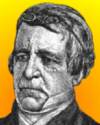 (source)
(source)
|
Nathaniel Chapman
(28 May 1780 - 1 Jul 1853)
American physician who founded (1817) the Medical Institute of Philadelphia, the first post-graduate medical school in the United States. He editted medical journal, authored medical works, gave clinical lectures, and in 1848 was elected the first president of the American Medical Association by acclamation
|
Science Quotes by Nathaniel Chapman (2 quotes)
He, who for an ordinary cause, resigns the fate of his patient to mercury, is a vile enemy to the sick; and, if he is tolerably popular, will, in one successful season, have paved the way for the business of life, for he has enough to do, ever afterward, to stop the mercurial breach of the constitutions of his dilapidated patients. He has thrown himself in fearful proximity to death, and has now to fight him at arm's length as long as the patient maintains a miserable existence.
— Nathaniel Chapman
Quoted by William M. Scribner, 'Treatment of Pneumonia and Croup, Once More, Etc,' in The Medical World (1885), 3, 187.
If you could see what I almost daily see in my practice … persons … in the very last stages of wretched existence, emaciated to a skeleton, with both tables of the skull almost completely perforated in many places, half the nose gone, with rotten jaws, ulerated throats, breaths most pestiferous more intolerable than poisonous upas, limbs racked with the pains of the Inquisition, minds as imbecile as the puling babe, a grievous burden to themselves and a disgusting spectacle to others, you would exclaim as I have often done, 'O! the lamentable want of science that dictates the abuse (use) of that noxious drug calomel!'
[Calomel is the mercury compound, Hg2Cl2.]
[Calomel is the mercury compound, Hg2Cl2.]
— Nathaniel Chapman
Quoted in Wooster Beach, A Treatise on Anatomy, Physiology, and Health (1848), 177.
Quotes by others about Nathaniel Chapman (1)
It was a standing joke of [Dr. Chapman] to quote old Leuwenhoeck as having discovered 'twenty thousand devils playing upon the point of a needle' thus foreshadowing some of the most remarkable discoveries of the present day, especially disease germs.
Opening address to American Medical Association, Cleveland, Ohio, 5 Jun 1883. In The Chicago Medical Journal and Examiner (1883), 47 4.
 In science it often happens that scientists say, 'You know that's a really good argument; my position is mistaken,' and then they would actually change their minds and you never hear that old view from them again. They really do it. It doesn't happen as often as it should, because scientists are human and change is sometimes painful. But it happens every day. I cannot recall the last time something like that happened in politics or religion.
(1987) --
In science it often happens that scientists say, 'You know that's a really good argument; my position is mistaken,' and then they would actually change their minds and you never hear that old view from them again. They really do it. It doesn't happen as often as it should, because scientists are human and change is sometimes painful. But it happens every day. I cannot recall the last time something like that happened in politics or religion.
(1987) -- 


